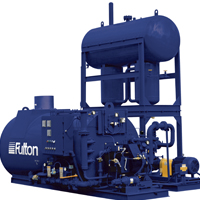 FULTON. THE BEST KEPT SECRET IN THERMAL FLUID TECHNOLOGY
FULTON. THE BEST KEPT SECRET IN THERMAL FLUID TECHNOLOGY
The Fulton name is synonymous with heat transfer solutions and produces an unrivalled range of thermal oil, steam and hot water boiler solutions.
And because Fulton now offers a range of thermal fluid heaters and multi-fuel-fired steam boilers, they are well placed to offer customers an unbiased review of their heat transfer requirements. (Read More)
Thermal Fluid: The Facts
Water and steam are typically used as heat carriers in heating systems, but at high temperatures, both require a corresponding high operating pressure. For industrial heating systems, a high temperature is often a great advantage, but establishing this with water and steam can be controversial and expensive.
Thermal fluid heaters use specialist oils as heat carriers and operate at atmospheric pressures up to 300°C. To gain a similar operating temperature from traditional water- or steam-based systems would require a pressure of 85 bar. Thermal fluid heaters are therefore an ideal source of heat for industrial processes where high process temperatures are required and there are circumstances, especially where low running costs is a requirement, where they are more suitable for heat transfer than steam systems.
A properly designed, installed and maintained thermal system that uses the correct thermal fluid for the application’s operating conditions should give 20 to 30 years of reliable service. However, like with water and steam systems, maintenance is essential for safe and effective operation; and the thermal fluid should be checked regularly to verify that it has retained its heat transfer properties.
Thermal Fluid v. Steam
But at what point does thermal or steam become the best or most cost-effective solution for a process?
The choice between adopting steam or thermal systems is determined by the requirements of the process and its temperature range. In general, if the process requires a temperature below 180°C, steam is usually the first choice. However, if the required process temperature is above 180°C, thermal fluid is often the better solution.
Thermal systems, unlike steam, provide useable temperature with very little pressure and a variety of cost savings should be expected. The additional control provided by thermal systems also allows multiple, easy and accurate temperatures throughout a single system that can also include cooling. There are also no freezing hazards, they provide rapid start up and shutdown with minimal heat losses and there’s no requirement for blow down or condensate losses.
The whole life costs for thermal systems can also be cheaper because they require fewer insurance inspections, which minimises production downtime and shut down periods. There’s also no requirement for water treatment or chemical dosing, which leads to zero waste disposal and minimal maintenance costs.
Fulton Thermal Heaters
With a range of thermal oil systems Fulton is now considered a major provider of thermal fluid solutions. Its thermal fluid heaters feature a four-pass, high-efficiency design that pre-heats the combustion air. Their compact construction can, like many Fulton systems, be skid-mounted with ancillary equipment and their layout designed to suit the customer’s requirements. The range includes models with heat outputs to 3500kW and standard operating temperatures of 345°C (400°C is also available with optional heater enhancements and suitable thermal fluids). Fulton’s FT-N features a compact, vertical design with the capacity to operate at temperatures up to 340°C and with heat outputs from 22 to 504kW. The FT-C offers outputs from 235kW to an impressive 4.1mW and its largest heater, the horizontal FT-HC, provides heat outputs from 0.7 to 5.9mW.
Fulton Fuel-fired Steam Boilers
Fulton has been designing and manufacturing high quality steam boilers since 1949. The eight models in the vertical ‘J’ Series range covers outputs from 96 to 960kg/h and can quickly raise full steam output in just 20 minutes. Three JFS models offers peak-rate outputs between 300 and 680kg/h and are manufactured with larger pressure vessels to allow a much greater flash reserve to be stored. The seven-model VMP combines high output and efficiency with a small footprint and low maintenance; and covers outputs ranging from 626 to 2348kg/h and with a maximum fuel-to-steam operating efficiency of 85%. Fulton’s nine model horizontal RB provides outputs from 1150 to 4787kg/h and can be specified with matched multi-stage oil, modulating gas or dual-fuel burners as standard. The largest boiler from Fulton is the eight model FB, which has outputs from 4,699 to 25,000kg/h at 10.34 barg and can be configured for gas, oil or dual-fuel installations and for either steam or hot water applications.
Fulton Electric Steam Boilers
Fulton’s compact electric boilers cater for a wide range of applications and combine traditional engineering in a number of versatile modern packages with outputs ranging from the 14kg/h (9kW) Mini Compack to the 2393kg/h (1500kW) FB-L. The seven-model Electropack, is designed for steam loads between 29 and 160kg/h and is ideal for ‘clean environments’; and the four-model EFS range, which has been designed specifically to deliver the short period/high demand steam loads at a steady pressure (typically 3 barg).
Fulton Packaged & Skid Mounted Systems
Fulton manufactures a range of modular or bespoke plant rooms and skid-mounted systems. All are designed to be delivered to site and installed on a prepared concrete base and final installation is made easier by connecting to pre-installed termination points. Single or multiple skid-mounted systems are available complete with all necessary ancillary plant for a range of applications.
Fulton After Sales Service
And finally, Fulton’s service doesn’t just stop when a boiler or system has been sold. Its one-day training courses (Operator Routines & Maintenance and Knowledge of Steam Systems) are certified by City & Guilds and offer a mix of theoretical and practical operational assignments which, Fulton claims, bridges the gap between the more expensive courses – that can cost many thousands of pounds per employee – and straightforward ‘toolbox’ training.
Additionally, the company’s nationwide Service & Installation team is available to deal with the requirements for steam boiler installations and retrofitting of additional ancillaries where customers that don’t have access to an installation service can draw on Fulton’s extensive experience. Water treatment service packages and a commitment to provide a comprehensive stock of spare parts available for next day delivery as standard, completes the total solution packages available from Fulton.
Fulton Technology in Action
Specialising in the manufacture of precast masonry blocks, Interfuse’s plants are amongst the most advanced facilities of their kind in the UK and are capable of producing around 21 million dense and lightweight blocks per year.
The manufacturing process for the concrete and lightweight building blocks uses a press to precast the products and a series of kilns to provide heat for rapid curing and, at its Gainsborough site, Interfuse replaced a live steam system that was proving too expensive to operate, with a Fulton FT-C vertical coil thermal fluid heater.
Commenting on the installation, Interfuse works manager Len Parks says: “Using live steam for the curing process at Gainsborough was costing the company in the region of £20,000 per month in fuel costs alone, so while the change to the Fulton FT-C thermal fluid boiler proved to be a significant investment, the thermal fluid system’s operating costs are about a tenth of those for the steam system, so we are expecting to achieve payback in three to four years.”
Whilst the decision to change to thermal fluid was based on the company’s positive experience over a number of years with a German-manufacturer boiler at its Syston facility, Interfuse decided that UK-based service and support was essential for the new boiler. “Fulton’s UK base was a big incentive when choosing the replacement.” says Len.
Highlighting other significant reasons for the change, Len confirms that thermal fluid is much cleaner than the original steam installation and the maintenance costs are significantly lower because no annual strip-down is required. In addition, there are no associated costs for mains water, water softeners or chemicals to run the system, nor are there pressure regulations to adhere to.
For further information on its heat transfer solutions, call Fulton on:
+44 (0)117 972 3322
email This email address is being protected from spambots. You need JavaScript enabled to view it.
or visit www.fulton.co.uk




